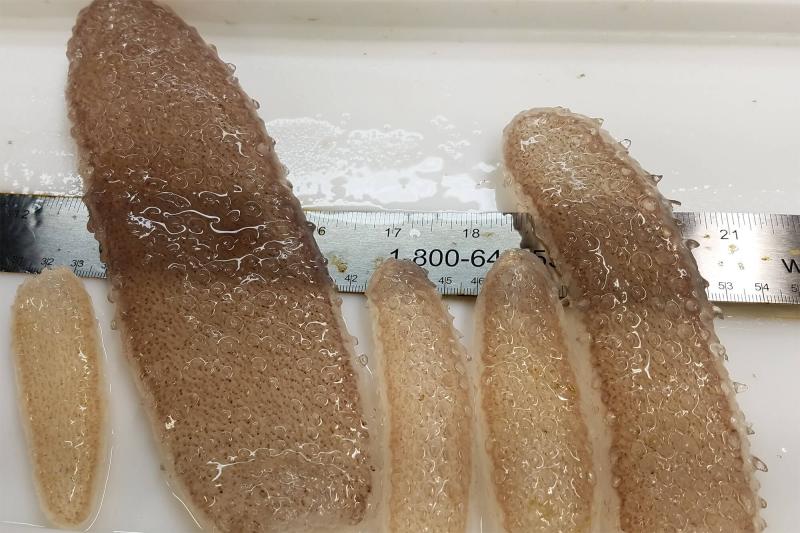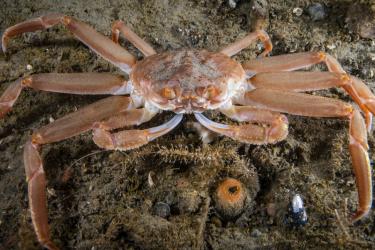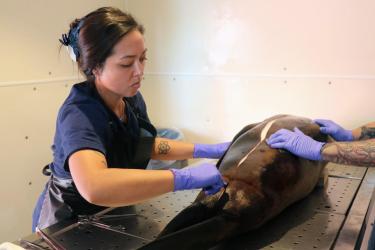Heatwaves are becoming more frequent and intense in our oceans, disrupting ecosystems and impacting everything from plankton to fish. Researchers at NOAA Fisheries (Northwest Fisheries Science Center and Pacific Islands Fisheries Science Center) and Oregon State University used ecosystem models to examine the consequences of these heatwaves on the food web of the Northern California Current. This highly productive ecosystem supports important fisheries and endangered salmon. The journal Nature Communications published their findings in their latest issue.
Heatwaves Disrupt the Food Web
The Northern California Current ecosystem has experienced anomalous warm water periods since 2013, including several marine heatwaves. These heatwaves are periods of prolonged, abnormally warm ocean temperatures that can significantly alter marine ecosystems.
They have led to:
- Documented changes in the abundance and distribution of species
- Impacts on fisheries
- Declines in primary productivity
- Mass mortality events
For example, some gelatinous species, like pyrosomes, increased dramatically, while others, like some jellies and fish, decreased.
If we could understand the ecosystem-wide effects of marine heatwaves on the Northern California Current, then we could develop adaptive management strategies for fisheries and threatened species in the face of climate change.
For current conditions, check out NOAA's Marine Heatwave Tracker
Using Models to Analyze Food Web Disruptions
Researchers used food web models to quantify how marine heatwaves impact the energy flow and feeding relationships between organisms within the Northern California Current. The researchers compared two end-to-end ecosystem models representing periods before and after the onset of heatwaves.
“Food web models allow us to estimate the cascading effects of marine heatwaves throughout the ecosystem,” said Dylan Gomes, lead author of the study, formerly of NOAA and Oregon State University, and currently at the US Geological Survey. “By tracking all of the many direct and indirect relationships within food webs, these models help us identify potential winners and losers as the ocean reaches new conditions.”
They estimated the effects on energy flow between producers and consumers across all trophic levels. Also, they analyzed changes in biomass, trophic interactions, network complexity, and the energetic consumption and contribution of various functional groups.
Pyrosomes Take Center Stage
The researchers found marine heatwaves have potentially negative implications for species at the top of the food web, including commercially important fisheries and endangered salmon.
Lower trophic levels, such as plankton and small crustaceans, experienced the biggest changes in biomass and energy flow after the heatwaves. The abundance of a gelatinous zooplankton species, known as pyrosomes, skyrocketed. They became the dominant consumer of lower trophic level energy, which may be related to reductions in krill. This shift in energy flow did not transfer to higher trophic levels; predators, such as salmon and sea lions, don't appear to consume pyrosomes.
“Pyrosomes consume animals at the base of the food web and lock up that energy,” says Lisa Crozier, a research scientist at NOAA Fisheries Northwest Fisheries Science Center and co-author of the paper. “They’re taking energy out of the system that predators need.”
The food web effects aren’t the same for everyone, however. For example, the Chinook salmon commercial fishery declined after the marine heatwaves. Other species, like Pacific jack mackerel, thrived under the new conditions, highlighting potential winners and losers in a changing ecosystem.
Despite the changes, the ecosystem appears to be stable. The researchers found that the position of the average predator and prey and the total number of interactions among them in the food web have stayed the same. That is, positions and relationships amongst species shifted, but the food web itself maintained important properties. This suggests that the ecosystem may be adapting to the new conditions. How the ecosystem will fare long-term if warm ocean temperatures persist remains to be seen.
Researchers say the study highlights marine heatwaves' complex and cascading effects on marine ecosystems. While some species may benefit from these changes, others are likely to struggle. Understanding these dynamics is essential for adapting fisheries management practices and protecting marine biodiversity in a warming world.




